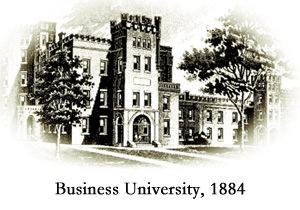History
A brief history of the Gordon Ford College of Business

The Gordon Ford College of Business began as a small, private business school in Glasgow, Ky., in 1874. A decade later, rising enrollment caused founder A.W. Mell to search for a larger building to house what was known at the time as the Southern Normal School and Business College. Not finding suitable quarters in Glasgow, he moved the school to College Street in downtown Bowling Green. As Mell continued to pursue other interests, enrollment declined from approximately 600 to 28 students and he sold the school to brothers T.C. and H.H. Cherry in 1892.
The Cherry brothers added more teachers and embarked on a widespread advertising campaign that reached as far south as Mississippi and Louisiana. The advertising strategy worked and enrollment climbed quickly. The first catalog of the institution listed spelling, penmanship, bookkeeping, banking, and business correspondence as a few of its course offerings.
A few years after taking over the Southern Normal School, T.C. Cherry left to become superintendent of the Bowling Green City Schools and H.H. Cherry remained to conduct the daily affairs of the college. Disaster struck in the fall of 1899, when a fire destroyed the College Street building. Cherry was able to borrow space from the business district to continue studies. A new building was built, nicknamed "the towers" by students.
As the school continued to grow, Cherry fought to make the school a state-supported institution. The state finally agreed and in 1906, legislation was passed, making a portion of the school the State Normal School for Teachers. The business section was not a part of this action, and thus sold to J.S. Dickey, W.S. Ashby, and J.L. Harman, being named the Bowling Green Business University (BU).
BU garnered recognition as a premier school because, at the time, most state institutions did not offer business courses. In addition, BU recruited top-quality students and hired successful business people as its faculty. The majority of the faculty was comprised of lawyers, professional accountants, and successful business owners.
Some of the faculty included Jo "Top" Orendorf, a former bank president and stockbroker; J.C. Holland and J.R. Meany, who both founded accounting firms; Warren District Judge Henry Potter; former Circuit Court judges William Allender and J. David Francis.
The list of BU alumni also includes top names such as: Cordell Hull, secretary of state under Franklin D. Roosevelt; former Kentucky Governor Louie B. Nunn; and Wiley Rutledge, former U.S. Supreme Court Justice.
BU enjoyed a reputation for being a rigorous institution, admitting students from nearly every state in the Union and countries such as Saudi Arabia and Japan. For many years, the college was the only four-year privately-owned college in the field of business accredited by the National Association of Business Colleges. Organizations across the country came to BU every spring to hire its students, because BU students were renowned for their business expertise.
Ownership of BU was transferred to a nonprofit corporation in December 1960, changing its name to the Bowling Green College of Commerce. After losing enrollment and unable to raise enough money to sustain itself, the trustees of the nonprofit institution decided to work with Western State College President Kelly Thompson to merge the two schools. This was accomplished on June 1, 1963.
Its name was changed in 1972 to the Bowling Green College of Business and Public Affairs, and again in 1979 to the Bowling Green College of Business Administration.
After receiving a $10.6 million gift from BU alumnus Gordon B. Ford, the college was renamed the Gordon Ford College of Business. It has enjoyed this name since December 1998.
References:
Duncan, T. (10 May 1963). Commerce College-Western Merger Is Announced Today. Park City Daily News.
Retrieved from: http://digitalcommons.wku.edu/cgi/viewcontent.cgi?article=1506&context=dlsc_ua_records
Harman Sr., J. Lewie. (1 January 1948). Brief Historical Sketch of the Bowling Green Business University. WKU
Archives Records. Paper 589. Retrieved from: http://digitalcommons.wku.edu/dlsc_ua_records/589.
Kerrick, S.L. (1 June 1984). BU Legacy: School may be gone, but it hasn't been forgotten. Park City Daily News. Page
6-A. Retrieved from: http://digitalcommons.wku.edu/cgi/viewcontent.cgi?article=1506&context=dlsc_ua_records


The Gordon Ford College of Business is a top business school with dual AACSB accreditation in both business and accounting programs.
Some of the links on this page may require additional software to view.

